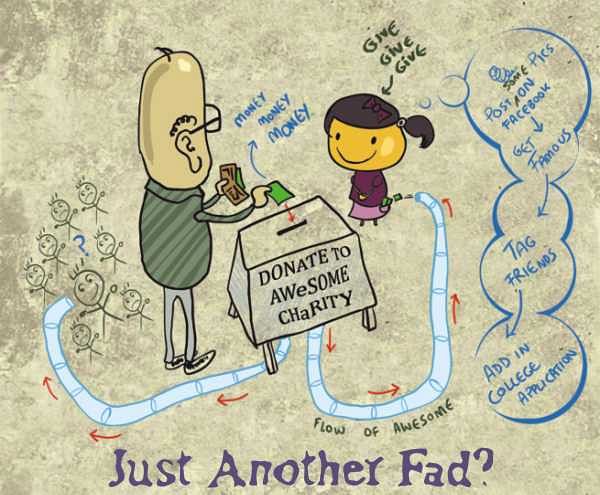
Story: Tahmida Zaman
Illustration: E R Ronny
There was sheesha lounges and street racing with modified cars. Underground sports tournaments. But, like other things, those quickly lost their charm. Enter the next big trend: urban youth volunteerism.
The city youth have always been looked at as a selfish, self-centered bunch; a group that neither knows, nor wants to know about the people that exist outside their air-conditioned apartments. Snobs, brats. The titles stick even today. But then, around a decade ago, something started to change. These groups of kids started getting together. “Community Service Clubs,” they called themselves.
Today, hardly a day passes without an invitation to “Help Eradicate Hunger” or to “Save A Child” on Facebook. There are scores of these clubs that one can sign up for and join, all at the click of a button. Many young people who are interested in community service are affiliated with multiple such organisations. It all sounds great. The brats of yesterday are finally turning into an active and socially responsible group. Right?
Not necessarily. Every young person who volunteers for community service doesn't always have noble intentions. Most clubs provide certificates and awards to volunteers, sometimes even for a single day of work. With so many students applying abroad for higher studies, a certificate for community service may just be what makes or breaks the deal. “Serving the community” also has a feel-good factor to it. Many are also in it because of peer pressure, 'because all my friends are doing it'.
RS talked to Adnan Fakir, who has been involved with a number of community service organisations over the past few years. Regarding this phenomenon, he says, “Before, kids used to get together at a fast-food place or at someone's rooftop to have some fun. Now, they're still doing the same thing, only they've taken it out onto the streets in the name of community service and awareness-raising.” When the volunteers' explicit objectives are to get a shiny award for a single day of work or just to feel good about themselves doing something fun with their friends, how much 'service' are they actually doing to the community?
The organisations that recruit these young people are no less to blame. Many of them are newly-formed, catching on to the recent fad of youth volunteerism. Not all are transparent, though. There have been cases when the organisation had pocketed funds that were raised for an apparently worthy cause, or had used them inappropriately; a fact that Adnan sadly affirms. Overall, there seems to be a big question of commitment and purpose, both on the part of the volunteers and the organisations that they work for. Ultimately, this demeans those who actually work sincerely.
But even those with the best of intentions are often failing to make a difference. “The youth today are more focused on getting down to action.” This means that they often forego the research and planning phases, which are vital to a project's success. “Everyone wants to start a school.
But what they don't think about is whether they have the required skills to actually teach something useful there.” Sending ill-equipped youngsters to deal with society's problems doesn't look to be helping much. In fact, they could be doing more harm than good through their underplanned interventions. “In the long run, it may have bad effects on the society and the people who are subjected to such 'experiments',” opines Adnan. In their defence, many of the better-established organisations now have mandatory workshops for volunteers before they take on a project.
RS asked 62 youngsters from a variety of socioeconomic backgrounds why they engage in community service. 16 said that they do it to improve their communication and organisational skills. ECA certificates and “making people happy” came into a second place tie, with 13 votes each. Five admit that community service “is a great way to network and make new friends”. Bareesh, an A' Level student, argues that the intentions do not really matter as long as the intended results are achieved. He admits that he is not really interested in making a difference, “But my friends and I still helped raise funds for an underprivileged school. They still got the money, and it helped them.”
With young people having such diverse reasons as to why they want to undertake something as noble as community service, the question remains as to how motivated they really are about what they are doing. What impact do they have on those in whose lives they intervene? When youth volunteerism is as big as it is today, it's difficult to ignore its consequences. At the same time, its worth mentioning that young people turning out in hordes to serve the community may look ideal on paper, but the realities on the ground may be very different indeed.
